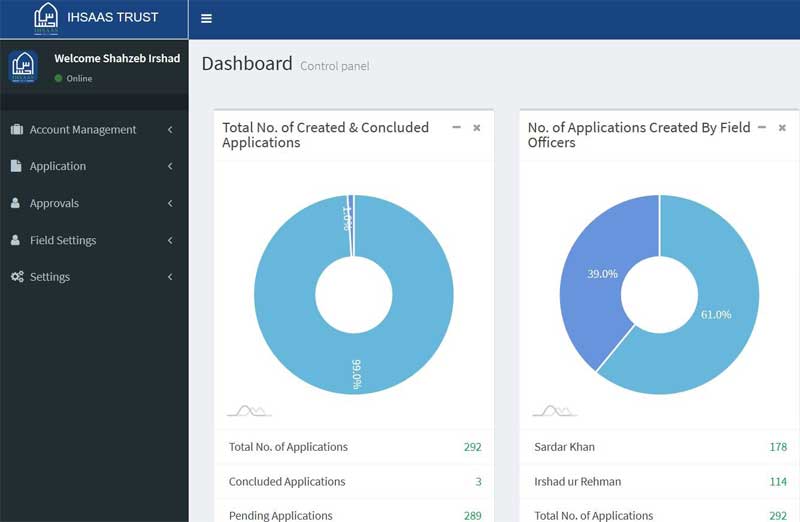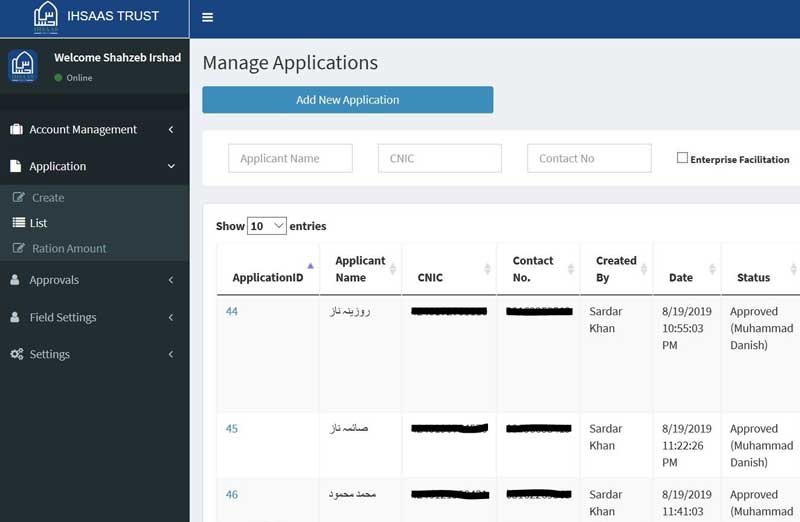When I joined Ihsaas in April 2018, I was given the charge of streamlining the Trust’s considerable disbursement of Zakaat and non-Zakaat funds to support Karachi’s poorest. To give an idea of the scale at which we were operating, the following fact will suffice:
Between 2016 and 2018, the Ihsaas Trust disbursed an excess of Rs. 116 Million to support 400 families in streams like education, healthcare, funds for house construction, dowry and loan repayment.
With this post, I am putting down our progress in the last 18 months so that I may thank some key people who’ve helped along the way and to ask for feedback from this network.
From its inception in 2012, the Ihsaas Trust had a dedicated field team to go out, identify and assess cases on the basis of legitimate need. The function was built on a strong need assessment approach. The Trust’s field team visited each potential beneficiary, assessed their need and recommended options for support from the Zakaat or Sadaqa Funds. All efforts by the field team, along with the data collection and recommendations were meticulously documented.
However, we decided to shift away from this strategy. Previously, cheques would be issued to deserving families in lieu of financial support for healthcare, education, rations or a combination of all three. This presented a dual challenge: we couldn’t check whether the funds were used for the purpose for which they were disbursed and the fact that even if the funds were spent in the right stream, the quality of service provision for health or education could never be ascertained and/or improved.
- The Ihsaas approach converts inflows to partners into non-zakaat contributions.
- This is important because non-zakaat contributions allow our partners to utilize the funds in any aspect of their operation that they choose e.g. payroll, capital expenditures or supplies.
In order to solve for these challenges, we decided to make two significant changes. The first is to shift from individual disbursements to institutional disbursements. Quite simply, we partnered with credible education and health service delivery organizations that have a large footprint in Karachi. Current partners in healthcare include SINA (for primary health), The Health Foundation (for Hepatitis), Kiran Patients Welfare Society (for cancer treatment) and the Memon Medical Institute and Patel Hospital (for any tertiary health procedures). Within this new approach, all approved cases in the health and education stream are referred to the right service delivery partner and the Trust adopts all the billing for that service.

For the rations stream, the Trust has opted for a direct cash transfer model by reducing the time to disbursement through mobile payment solutions like Meezan Bank’s Cash over Counter service and Telenor’s EasyPaisa. The decision on the amount to be disbursed for rations is tied to the number of people in the household thereby improving equitable distribution and curbing waste.
Success Metrics:
Through initiatives like these, the we not only hope to improve social mobility for the poor but also provide avenues for immediate relief needed along the way. By focusing on in-person needs assessment for all cases, the Ihsaas Trust is leading the way in matching philanthropy to avenues where it is truly needed. This is definitely an innovation in Pakistan because the traditional non-profit model is to create shariah-advisory boards that are incentivized to treat the maximum amount of donations as Zakaat thereby, increasing the funds available to non-profits for operations. The Ihsaas approach converts inflows to partners into non-zakaat contributions. This is important because non-zakaat contributions allow our partners to utilize the funds in any aspect of their operation that they choose e.g. payroll, capital expenditures or supplies.
In addition, beneficiaries of this system now get routed directly to institutions that can provide timely and targeted relief without any additional expenses or waiting times for people in need. Granted, this approach costs more than just donating money directly to the charity of one’s choice. However, consider the following societal benefits of this model:
- All billings adopted by Ihsaas with any of our institutional partners are based on MoUs negotiated at market rates i.e. if a non-profit offers primary health services for 30 rupees per patient while their actual cost is 500 rupees, Ihsaas would pay the organization 500 rupees per patient. This will not only reduce the burden on the non-profit to raise the difference through donations but also give them an avenue to continue their operations sustainably.
- There are many non-profit organizations working in the fields of health and education but they are doing so in isolation. They don’t do it by design but because there is no central body there to make connections across spheres by a referral mechanism for people to the right institutions.
Thus, the Ihsaas model not only routes referrals (from its own field team) to the right institutions but it has also catalyzed partner institutions referring their own cases to Ihsaas and asking to refer them to other partners more specialized in that particular need i.e. our primary health partners now routinely refer cases to us that require specialized treatment for cancer or surgeries which we route to the appropriate entities.
Quite simply, we are building institutional linkages in the health and education landscape while engendering innovation to eliminate poverty through enterprise facilitation (which I’ll cover in a future post). This is not easy and it will definitely not be fast. However, we are confident that the team behind the progress till now will continue in the same direction and hopefully improve the lives of the underprivileged.
One of the milestones that I’m happy to share here is that we have successfully digitized all Zakaat and non-zakaat case processing. We have developed a mobile and web application processing platform that allows our field team to eliminate paper-based forms and allows the team in the office to perform real-time monitoring and efficient processing for the cases.
We hope to partner with more healthcare partners in the future to provide greater coverage to Karachi and enhance the healthcare ecosystem for those in dire need of it.


Leveraging philanthropic deployment in this way would not have been possible without the support and guidance from Ihsaas Trust’s Board of Trustees and the team on the field that went out and did all the actual work. You know who you are and your work here will be your legacy inshaAllah.




